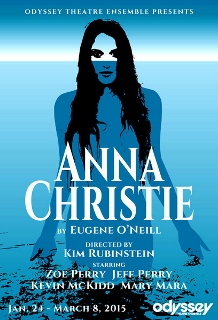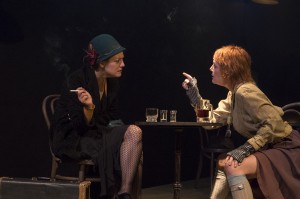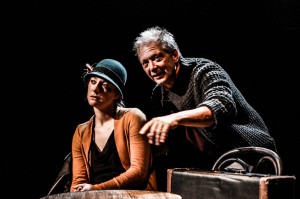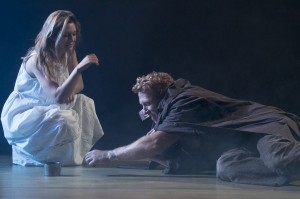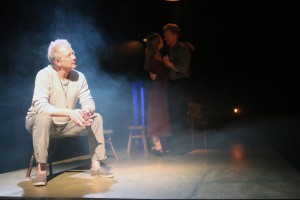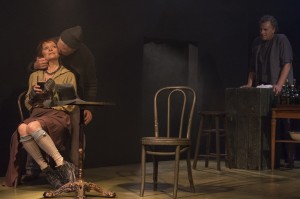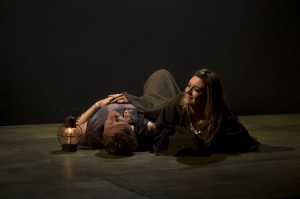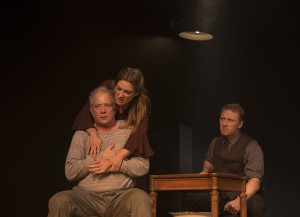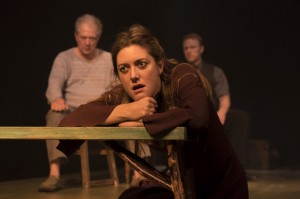SAILING THROUGH FOG
The title of Eugene O’Neill’s 1921 drama Anna Christie is the nom de guerre chosen by a hard-knock 18-year-old who decides that if she’s going to get pawed, she’ll damn well get paid for it. She hates men, God damn them, especially sailors, starting with the absentee father who entrusted her upbringing to strangers. Old salt Chris Christopherson successfully avoided raising Anna as flotsam in his ne’er-do-well life, but only in favor of ne’er doing well; to excuse his retreat from the basic responsibilities of humanity, he cultivates the mythology that he is cursed by “dat ole devil sea.”
At 20, Anna grudgingly initiates a reunion with dad, needing a place to retreat after months in jails and hospitals as a ward of the state. While she recuperates on Chris’s barge, that ole devil sea spits up the biggest, most virile shipwrecked sailor you could ask for. Mat Burke’s a hunky catch, but he’s not very quick, and he hates whores, an emotional infant who still believes in fairy tales about “good girls” like Anna. Anna falls for a man for the first time in her life, terrified that shattering Mat’s illusions will likely kill the both of them. In a panic that Anna will repeat the mistakes of her mother’s short life, Chris tries to chase Mat away.
Sounds like a bodice-ripper, but romantics beware: the 1920-model Eugene O’Neill is among the least subtextual dramatists. “At sea” is as poetic a contextual metaphor as he allows his characters, since tough-as-nails realist Anna delivers a running Freudian deconstruction of everybody’s neuroses, never letting the other characters skate into delusion or obfuscation (and rarely into imagery; what symbols do appear are sharp enough to put your eye out). Everyone’s agenda is upfront and center stage. When the exposition is this constant, I feel it’s polite for a production to supply its own poetry. The stripped-down aesthetic of the late postmodern era has not been all things to O’Neill, or to Ibsen for that matter; a nude realist is not always a pretty sight.
The new Odyssey production greatly benefits from the thoughtfulness behind director Kim Rubinstein’s often searing images. Physically, it’s a great watch. Wilson Chin’s zen-minimal set, surrounded on three sides by water, floats in copious machine-made fog that I found pleasing (though I overheard two complaints, one stylistic, one of eye irritation). Michael Gend’s lighting of this show is effective, if (like that fog) too often self-conscious, and sometimes unnecessarily dim’”but these look to me like direction, rather than design. At any rate, when Kevin McKidd splashes out of the sea like an amniotic merman, you’re certainly watching a directed show. And thank God, or dat devil, for that.
Zoe Perry and her father Jeff Perry sustain a grounded, heightened intensity as Anna and Chris. Jeff’s facility for dialect and emotion is particularly gorgeous company; this Chris is a masterful performance. For some reason choosing not to play the character in dialect as written, Ms. Perry nonetheless convinces at all times; her harsh midwestern vowels are not inappropriate, and from me she commanded a consistent gravity of investment. The Perrys share a quality of relaxed, unhurried brevity that abets O’Neill’s strong structure and invigorates the meticulous dialogue.
McKidd is brilliantly cast as the lusty stoker, and while I thought he rushed his moments of discovery a bit at the first matinee, he remained an intelligent and thoroughly persuasive presence. Blessed with strong support from Mary Mara as Chris’s girlfriend Marthy Owen, and from Raquel Barreto’s attractive, expressive period costumes, the show has a deep bench. It’s looking to travel, maybe London, maybe Chicago, and I hope it continues to evolve.
Issues remain. Rubinstein’s command of the humor, especially in the most melodramatic moments, is not uniformly excellent. And not all the director’s interesting impulses necessarily integrate with logic’”in a quest to have every character interact with the sea, she uses the thematically charged body of water onstage as a representation of threshold-crossing, and so has the actors indicate a confusing number of imaginary entrances and exits; spatial definitions are similarly muddled throughout.
Martin Gutfeldt’s understated sound design works very well, and his live saxophone performance is a welcome mood-setter; but his choices for interstitial and underscoring music reflect a taste (his? the director’s?) for jazz about 30 years more esoteric than the apparent period, jarring in their modernity. Too, it seems an unnecessary anachronism for a girl wearing a flapper’s cloche hat to draw a filtered cigarette from a modern crush-proof box. These problems are all either fixable or ignorable, small stuff in the bigger picture of an entertaining show that’s got a good voice and isn’t afraid to sing.
photos by Diego Barajas, Anna McMillan, and Shivani Thakker
Anna Christie
Odyssey Theatre Ensemble
2055 S. Sepulveda Blvd in West L.A.
Sat at 2 & 8; Sun at 2
ends on March 8, 2015 EXTENDED to March 22, 2015
for tickets, call 310.477.2055 or visit www.OdysseyTheatre.com
[Read Stage and Cinema‘s review of the 2012 Old Globe production of Anna Christie, directed by Daniel Goldstein.]
